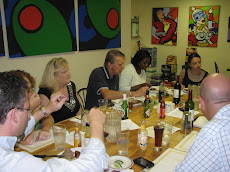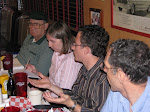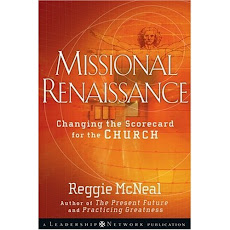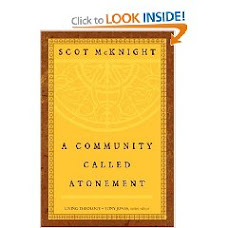
“Church is the only organization ever created for the benefit of its non-members.” *
Matt N. (Broward Emerging Christians - BEC Meetup member)
At right, Constantine I, Emperor of the Roman Empire Head of Constantine's colossal statue at the Capitoline Museums - image by Jean-Christophe Benoist
(Go here for link to the article Constantine I and Christianity)Fourteen of us met at Laura’s Cuban Restaurant on El Día de los Reyes to continue our conversation about new/old ways of doing church and Alan Hirsch’s book
The Forgotten Ways. In the excerpt of his table below, Hirsch compares two modes of church like this:
Organic Missional Movement vs. Institutional ReligionSeeks to embody the way of life of the Founder - vs. - Represents a more codified belief system
Has a cause - vs. - Is the cause
The mission is to change the future - vs. - The mission shifts to preserving the past
Tends to be mobile and dynamic - vs. - Tends to be more static and fixed
Decentralized network built on relationships - vs. - Centralized organization built on loyalty
People of the Way - vs. - People of the Book
Hirsh also compares what he calls, “Apostolic and Post Apostolic Mode” (AD 32 to 313) and "Emerging Missional Mode" (past 10 years) to “Christendom Mode” (313 to present). He generally demarcates at 313 because that is the year that Emperor Constantine made Christianity the state religion of the Roman Empire. While that act ended Christian persecution in the Empire and largely set the stage for the spread of Christianity throughout Europe and abroad, it also, in Hirsh’s view had a series of unintended consequences that have shaped the church to this day. Here is an abbreviated list that Hirsch includes as taken from Stuart Murray’s book,
Post-Christendom: Church and Mission in a Strange New World:
The movement of the church from the margins of society to its center
Infant baptism as the symbol of obligatory incorporation into this Christian society
The definition of “orthodoxy” as the common belief shared by all, which was determined by powerful church leaders supported by the state
A hierarchical ecclesiastical system, based on a diocesan and parish arrangement, which was analogous to the state hierarchy and buttressed by state support
The construction of massive and ornate church buildings and the formation of huge congregations
The increased wealth of the church and the imposition of obligatory tithes to fund the system
A generic distinction between clergy and laity, and the relegation of the laity to a largely passive role
The defense of Christianity by legal sanctions to restrain heresy, immorality and schism
The use of political and military force to impose the Christian faith
Hirsh concludes that this shift to Christendom was “…absolutely disastrous for the Jesus movement that was…transforming the Roman world from the bottom up.”
Jim R. started our discussion by sharing what brought him to the emerging conversation. He was born in the 1940s and came from what he described as a strict fundamentalist / Methodist background having only seen his first movie at the age of fifteen. It was also at fifteen that he became “certified” in his denomination and began to preach. Preaching however, he later decided was more his mother’s idea than God’s and he stopped. He attended
Asbury College and worked in the field of accounting for many years. He also teaches adults in the church he attends. His gift for teaching benefited by his earlier studies of Greek.
Jim said that he “became emergent before the word was coined.” By this he means that he is typically zealous in “challenging everything.” (Such an attitude might be considered by Hirsch as part of the fivefold ministry in Ephesians 4. As Hirsh puts it, “…disturbing the system is a critical function of [missional] leadership. It is about creating conditions in which change, adaptation, and innovation will take place.”) Two scriptures Jim says influenced him were, “Do your best to present yourself to God as one approved, a workman who does not need to be ashamed and who correctly handles the word of truth.” (2 Timothy 2:15) and “All Scripture is God-breathed and is useful for teaching, rebuking, correcting and training in righteousness, so that the man of God may be thoroughly equipped for every good work.” (2 Timothy 3:16). And two books that inspired him were,
Reign of the Servant Kings by Joseph Dillow which seeks a third way by challenging the systematic theologies of both Arminianism and Calvinism, and
A Life God Rewards: Why Everything You Do Today Matters Forever by Bruce Wilkinson. Jim summarizes what he learned in a hand-out he gave us that says, “Our eternal DESTINATION is the consequence of what we BELIEVE on earth. Our eternal COMPENSATION is the consequence of how we BEHAVE on earth.”
One of the things Jim challenges is the ordination of professional clergy claiming it is not found in scripture, and in practice does not appear until the time of Constantine.
Robin commented that there are examples of the laying on of hands to anoint those who spread the Gospel. Jim responded that even Paul the Apostle was “bi-vocational” and worked as hard as he could to avoid being financially dependent. We also discussed the origin of the “pulpit to pew” preaching style. Did Jesus and Paul give us examples of it or did it start in the way we know it today with Martin Luther as some claim?
In our ensuing discussion comparing the modes of “attractional” or “institutional church” with “organic missional movements” and “incarnational-sending church,” Kelly commented that in institutional church mode the “primary reason is eternal destination” whereas in missional mode the emphasis is more on “transforming our lives and the world.” We talked about how institutional church sometimes “boils down” the Gospel message in order to make it accessible to the point where it often loses its relevance to our lives, whereas when Jesus spoke in parables he spoke of a full gospel in the context of the real life situations of his hearers. In discussing the comparison of, “People of the Way” vs. “People of the Book,” Megan felt that non-Christians (and many Christians) might view the Bible as a legal text versus reading it to come to understand a new way of life. Robin said the approach to reading the Bible should be to know and follow God versus focusing on “sin management.”
We asked how we are and can be missional both as individuals and within community. Matt who is part of incarnating Jesus among the homeless with a group called “Love Bags” (see Aug. 13, 2008
post) told us about how one of the homeless people they have “church” with out in the street regularly, decided on his own not to wait for the weekly “Love Bags” event and held a “church service” on his own with his friends and put up a Christmas Tree they lit with some (eh hmm) “borrowed” electricity. Matt also told about regular dinners he’s been part of where friends and neighbors, both Christians and people who are not, have become very close. Kelly brought up an idea to reserve a table for twelve where three Christians might invite nine strangers to dinner just to eat and chat. Megan and Robin reminded us that conversations can naturally go to spiritual topics without having to “lead” the discussion. From people we meet at parties to bartenders, we are finding that there is such a thirst right now for deeper meaning and community that such conversations often happen spontaneously.
Due to the size of the Meetup this week, we formed two smaller discussion groups for part of our time. Wendy summarized her group’s discussion about institutional churches as their being, “too big and top heavy, locked into budgets and programs” and suggested that church could be smaller and more sensitive to the Spirit (“God in us directing what we do”) and more about caring for one another. They said, “Don’t put the job on the ‘leader’ that we’re supposed to have.” And that we should recognize that Christ is not only “in” us but needs to spread “out” of us, and that “worship is your life.”
We decided to meet again on Tuesday night, February 3rd and if anyone wanted to bring together any kind of gathering in the meantime, we’d announce that through
Meetup.
Peace and blessings,
Steve
*This paraphrase is from an original quote by Archbishop of Canterbury, William Temple who said, "The Church is the only society that exists for the benefit of those who are not its members." (Thank you to an alert blog reader :^)
 “I just want to
“I just want to













